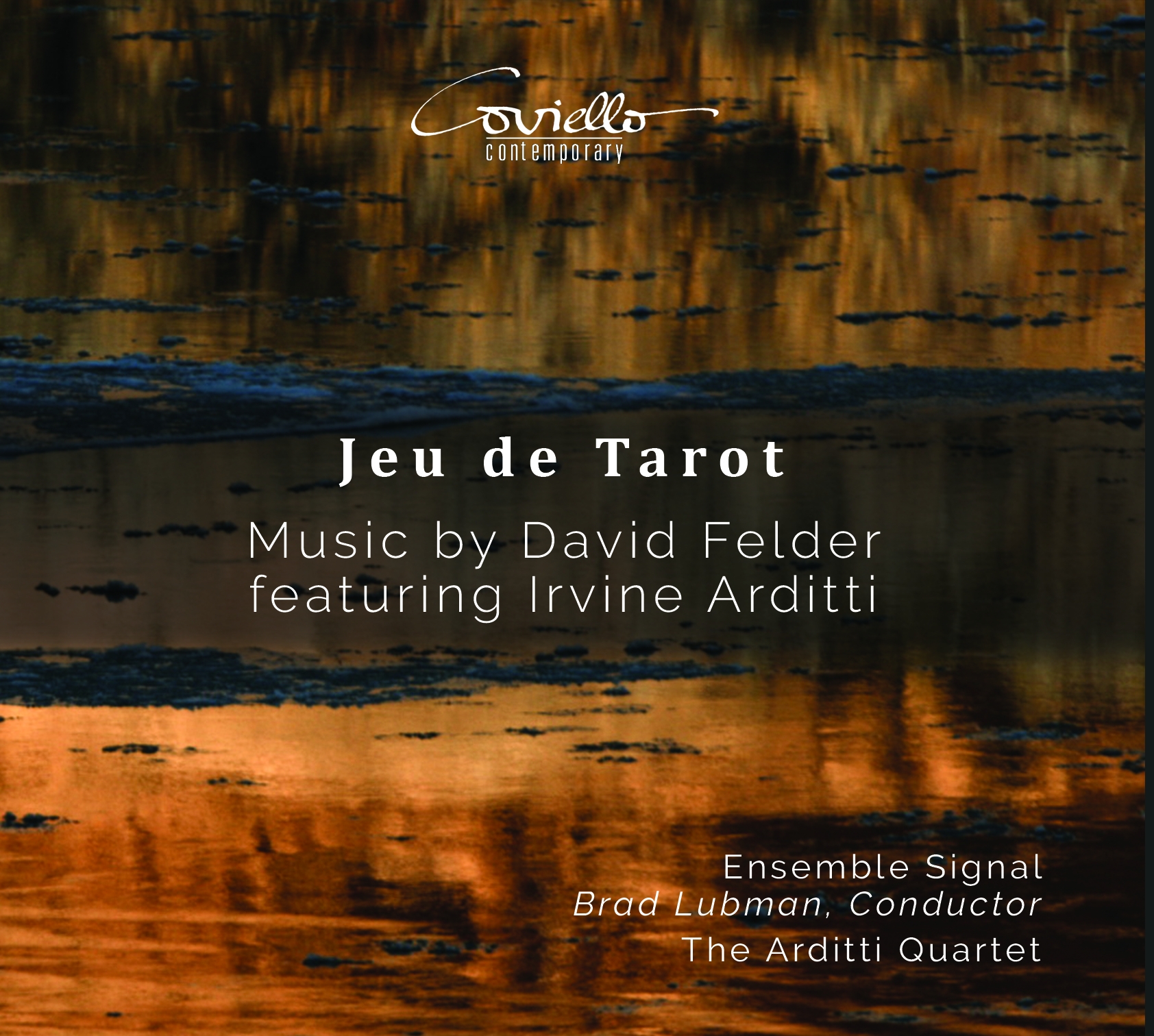- Jeu de Tarot
: Review
In his program notes for this CD, Tim Rutherford-Johnson describes David Felder’s recent works as “music to be heard in the first person (I am experiencing this), not in the third (they are playing that).” I suspect this is actually true of most music; but in any case, especially in the context of Colin Clarke’s review (which patiently lays out the complex programmatic bases for these pieces), I take this an invitation to begin with an idiosyncratic, quirky claim: The three works on this disc are, for me, Tuesday night music.
Tuesday night music? For a long time, I used to teach a Proust course on Tuesday nights, with three-hour classes that often stretched out well beyond the allotted time. Surprisingly, when I got home, I wasn’t tired as much as wired, so adrenaline-pumped that I needed something intense and complex to engage my brain. This music would have fit the bill.
Borrowing from John Story (Fanfare 25:5), I referred to Felder as an “undoctrinaire” composer (he’s no Milton Babbitt) when I interviewed him five years ago (34:1). In particular, he’s vigorously opposed to the “branding” so common among contemporary composers—and his music comes from broad experience with (and broad appreciation of) a wide variety of composers. Still, it’s fair to say that he has his preferences, even strong preferences. These three works, at least, are deeply rooted in the high Modernism of the twentieth century, and they call on supreme virtuosity, including some untraditional sound production techniques, on the part of the performers.
More specifically, as I hear it anyway, his music is an invitation to focus intently on small details (tiny melodic gestures, particular timbres, brief rhythmic figures) that are not developed in anything like standard 19th-century fashion. You might want to compare his work to a mosaic—but for the most part, it’s not the kind of mosaic that resolves into a clear picture when you step back from it. Yes, in the composer’s words, Another Face (1987)—which grows out of a “coded sequence” of two-note motifs that is repeated and transformed—does have “a certain lyrical something that is contained within the somewhat more fiercely deterministic materials,” a lyrical something that appears clearly in the surprisingly haunting cantabile at the end of the piece. But few listeners—as they experience the vehement and (in the composer’s words) “fiendishly difficult virtuoso” score, spiced with directions like “erratic” (which shows up four times) and “slightly crazy”—are likely to hear the lyrical something until it emerges. As a result, it will seem less like an inevitable resolution than a welcome discovery.
The two later works (Netivot from 2016, Jeu de Tarot from 2016–71) are even less conventionally lucid than Another Face. Thus, Felder says of Netivot that “Formally, the work wanders, meanders, through different regions, and inhabits each in turn as each arises.” That may be too comfortable a description. Meandering implies a kind of tranquil relaxation, and the description seems to promise a work in the manner of Vaughan Williams’s Tallis Fantasia. But even though much of the work is superficially slow in tempo, the shifts in timbre, meter, and texture, subtle as they are, paradoxically come at us fast and furious. Then, there’s the undertow of what might be called its dynamic counterpoint, as each instrument follows its own dynamic contours, resulting in a constantly changing balance among the instruments. The dense microtonal interplay—which includes both quarter-steps and “micro-intervals on the order of eighth-tones, or beating, subject to local interpretation by the performer”—only makes the music that much less settled. Sit back, lose your grip, and the music is reduced to a pleasant blur. It only takes on its true character if you are absolutely and unwaveringly attentive.
The same kind of motion “through different regions” characterizes all three works. Sometimes the wandering is quicker, more mercurial, as the landscape rushes by more quickly than we can see it (say, the hyperactive “Empress” from Jeu de Tarot, with its tortured and fragmented hints of waltz). Sometimes, the motion is superficially more static. But even at its most luminous (the calm conclusion to Netivot or the finale “Moonlight” movement of Jeu de Tarot), the music is never easy, and always demands the most severe and unwavering diligence. I can’t imagine listening to all three works in a row, even on a Tuesday night.
For the record, Netivot also includes an optional video component consisting of nature videos by Elliot Caplan. On its own, the photography is gorgeous—but it’s precisely that quality that, for most listeners, is likely to get in the way. With the music requiring such hyper-awareness, and with a video available as an easier alternative, the visual is apt to be a distraction more than a supplement. I therefore prefer hearing the sound alone, as it is on this disc, although those who want the full experience can find it on line.
As I said, the music is super-virtuosic—and we get super-virtuosic performances that rise to the composer’s exceptional demands. Irvine Arditti and the Quartet that bears his name need no introduction—they play this music with the ease and confidence of the Juilliard Quartet playing Bartók. (Netivot is in fact dedicated to the group, and Arditti is responsible for this edition of Another Face). The Ensemble Signal (supplemented here by a few members of Buffalo’s Slee Sinfonietta) is perhaps less celebrated; but Marc Medwin referred to their “absolute commitment and precision” in a recent Reich disc (40:3), and the same virtues are in evidence here. Good sound, too. And to add to the good news, he seems as productive as ever: His recent Die Dämmerungen, a 20-minute orchestral work got a profoundly considered performance at its premiere by JoAnn Falletta and the Buffalo Philharmonic in October; and he’s just finishing up a sequel to Jeu de Tarot.
All in all, this disc offers a superb workout for the intellectually adventurous. Peter J. Rabinowitz
Five stars: Demanding music, superbly played.
